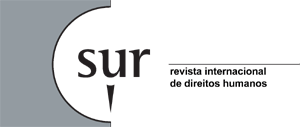Presentation
As in recent issues of our Journal, in this tenth edition we highlight one theme, to which we dedicate five of nine total articles. This theme refers to the plight of the millions of migrants and refugees who find themselves in dire situations in many countries around the world. The article by Katharine Derderian and Liesbeth Schockaert of Médecins sans Frontières realistically portrays the terrible human tragedy of refugees and, from the point of view of human rights, discusses the concept of refugee, according to the criteria of the United Nations High Commissioner for Refugees (UNHCR), under whose guidance and with whose generous support we were able to organize this edition. The UNHCR criteria and the foundations of the protection system for refugees are explained in the article by Juan Carlos Murillo.
In addition to the articles mentioned above that address general problems, we published the following contributions, which focus on specific problems relating to the human rights of refugees and migrants:
International Cooperation and Internal Displacement in Colombia, by Manuela Trindade Viana, focuses on problems related to internal displacement in Colombia, a country that contains 25% of the world's internally displaced population (11.5 million).
Access to antiretroviral treatment for migrant populations in the Global South, by Joseph Amon and Katherine Todrys, of the Human Rights Watch, denounces the violation of laws that guarantee access to health resources for non-permanent populations of migrants and refugees.
European Migration Control on African Territory, by Pablo Ceriani Cernadas, analyses the inhuman immigration control policies adopted by European governments and EU organizations on the coast and in the waters of North African countries.
Our tenth edition is completed with the contributions by Anuj Bhuwania ("Indian torture" and the Madras Torture Commission Report of 1855), Daniela de Vito, Aisha Gill and Damien Short (Rape Characterised as Genocide), Christian Courtis (Notes on the implementation by Latin American courts of the ILO Convention 169 on indigenous peoples) and Benyam E. Mezmur (Intercountry Adoption as a Measure of Last Resort in Africa). Bhuwania argues that police torture in India is a legacy of colonialism, as illustrated by the "Madras Torture Commission Report of 1855". De Vito, Gill and Short discuss the theoretical consequences of defining rape as a particular kind of genocide. Courtis presents emblematic cases of the application of the ILO 169 Convention on Indian and tribal populations in Latin America. Finally, Mezmur focuses on the problems associated with the policies for adoption of African children by families from other continents.
We hope that the articles presented in this edition will help to enrich the debate surrounding the growing number of problems associated with the displacement of vast human contingents, who were forced to leave their homes, not only due to wars, persecutions and political totalitarianism, but also due to various economic causes, whose detrimental consequences to the human rights of their victims are equally dramatic.
We would like to thank the following professors and partners for their help with the selection of articles for this edition: Carina du Toit, Carlos Ivan Pacheco Sánchez, Florian Hoffnmann, Gaim Kibreab, Glenda Mezarobba, Guilherme da Cunha, Iniyan Ilango, Jeremy Sarkin, José Francisco Sieber Luz Filho, Juan Amaya Castro, Laura Pautassi, Malak Poppovic, Paula Miraglia, Rajat Khosla Renata Reis, Roberto Garretón and Upendra Baxi.
As mentioned on our website, beginning with this edition, we have adopted new rules for citations and bibliographical references in order to facilitate the reader's experience. Because this is a recent change, we count on our readers' understanding in the case of any mistakes caused by such change. In this matter, we would like to thank the following individuals who contributed to the formatting of the articles: Clara Parra, Elaini Silva, Flavia Scabin, Mila Dezan, Rebecca Dumas and Thiago Amparo.
We conclude by stressing once again the importance of the guidance and support provided to us by the UNHCR for the publication of this edition, which originated as a doctrinal investigation and development of the "Mexican Action Plan for the Strengthening of International Protection of Refugees in Latin America", geared towards cooperation with academic institutions that are dedicated to the research, promotion and instruction of international law related to refugees.
In particular, we would like to thank the offices of UNHCR in Argentina and Brazil, and the Legal Regional Unit for the Americas.
The editors
Publication Dates
-
Publication in this collection
21 Jan 2010 -
Date of issue
June 2009

